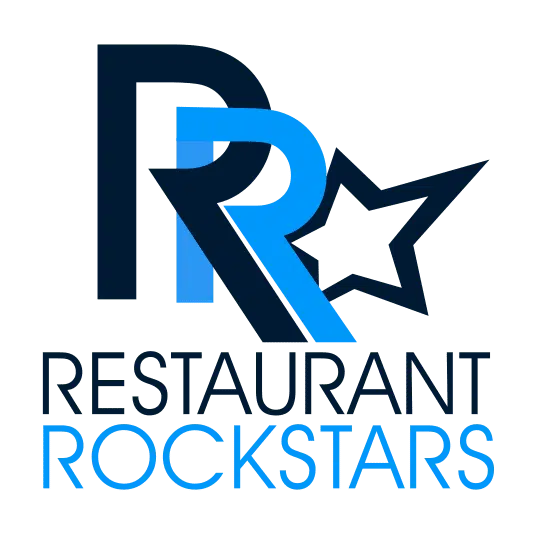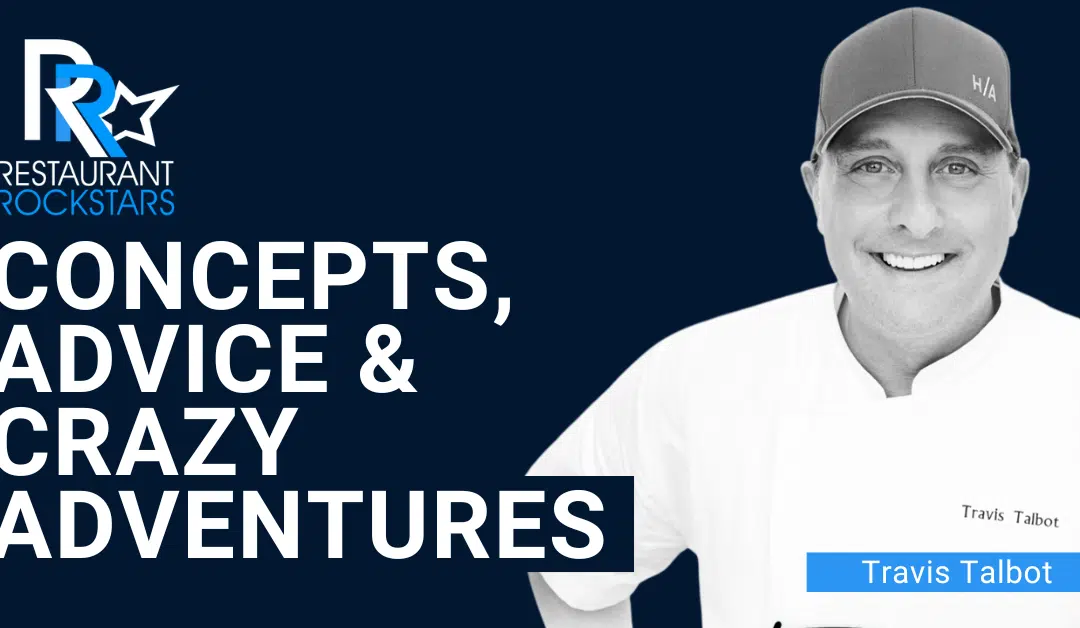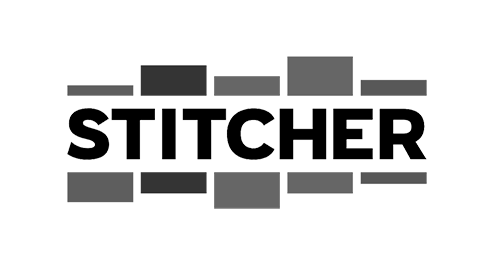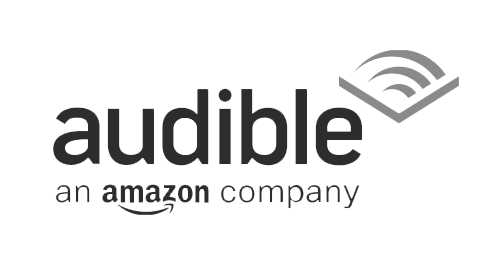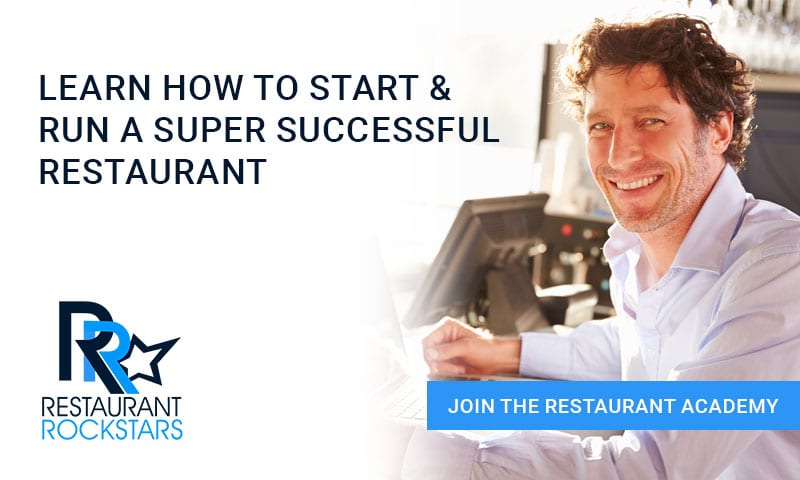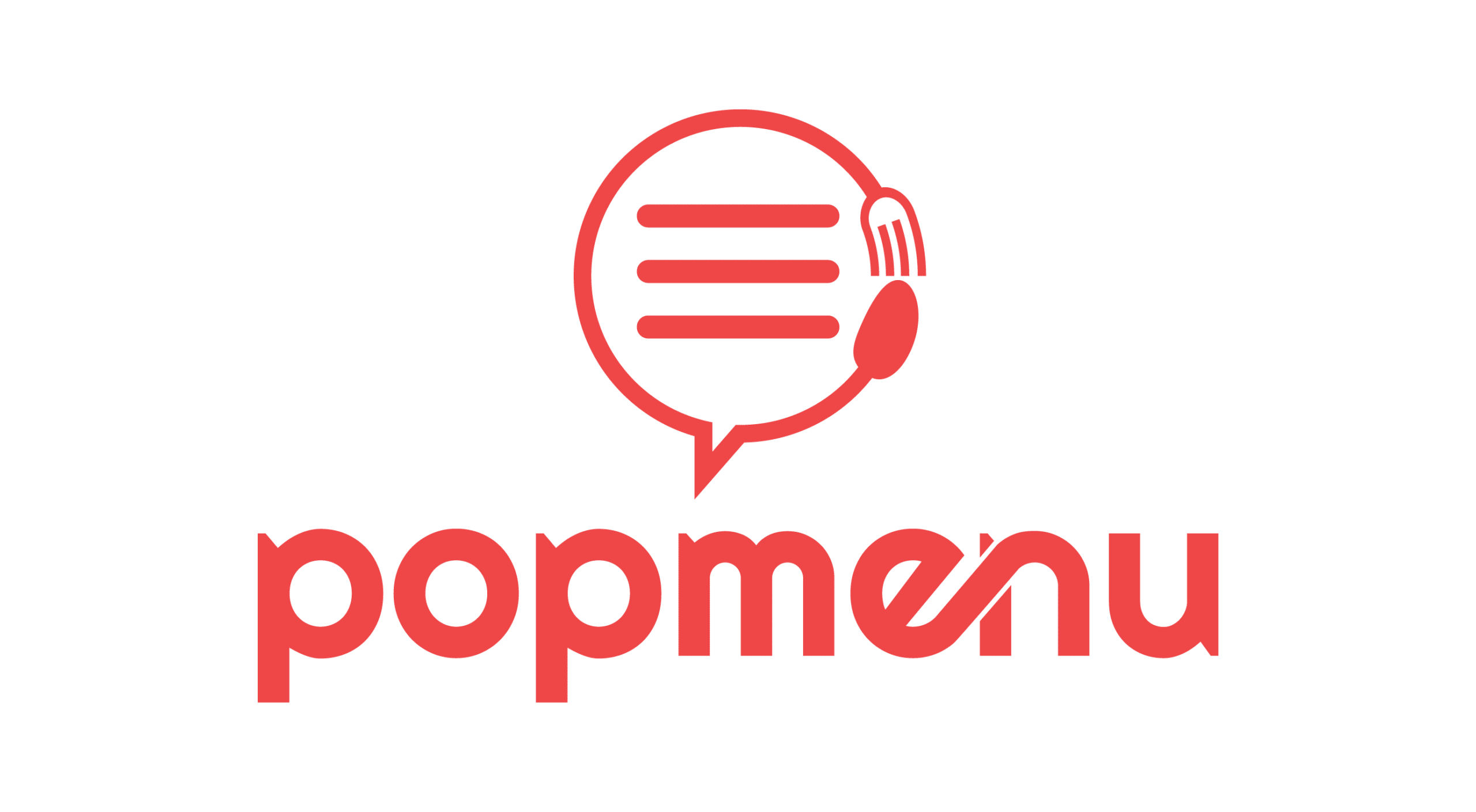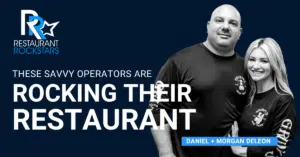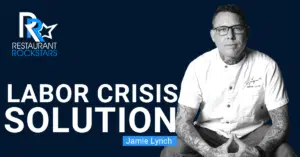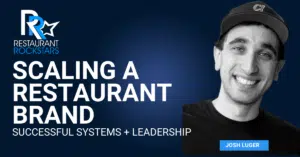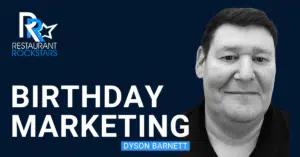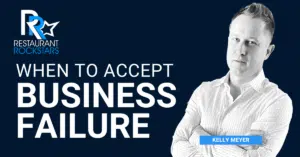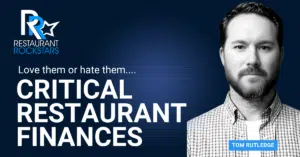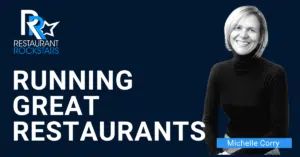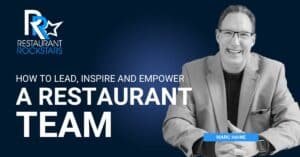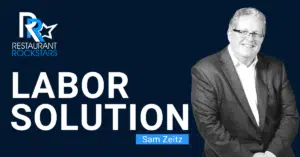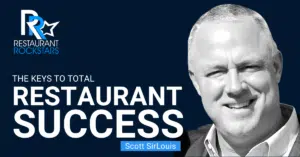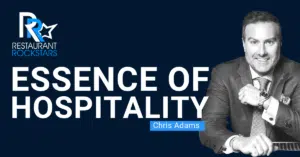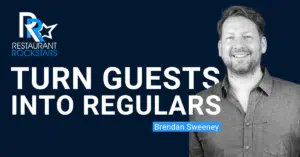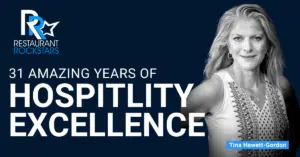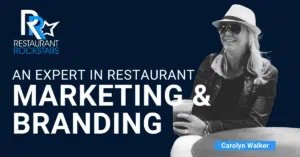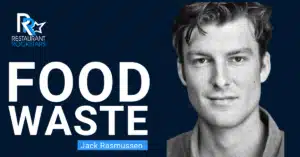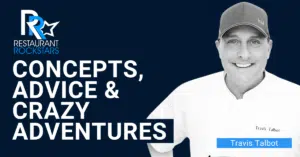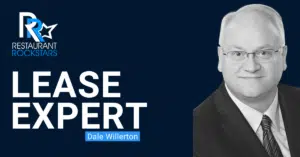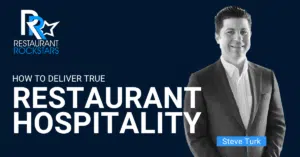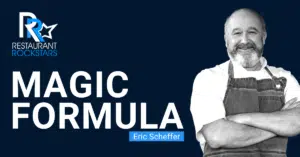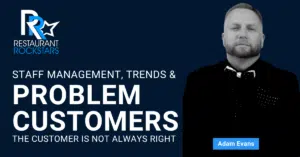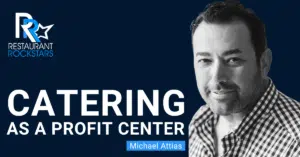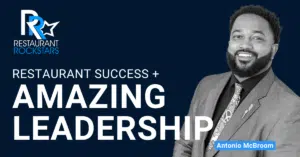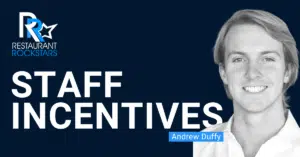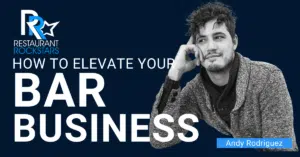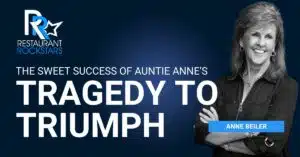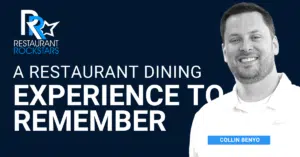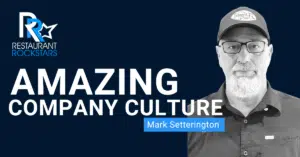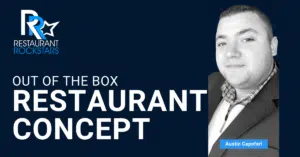Restaurant Rockstars Episode 333
Restaurant Concepts, Experiments & Crazy Misadventures
LISTEN HERE OR ON YOUR FAVORITE PODCAST PLAYER
Prefer to watch the interview?
Click the video below.
Everyone has a restaurant concept. Maybe your concept rocks, or maybe it could use a refresh and/or pivot!
In this episode of the Restaurant Rockstars Podcast, I speak with Travis Talbot, a global restaurant concept developer, hospitality impresario, cookbook author, restaurant coach, etc…
Travis has developed over 500 concepts for resorts, hotels, restaurants, and entertainment venues.
Don’t miss this episode as Travis shares:
- The “key ingredients” of a winning restaurant concept
- His appearance on Robert Irvine’s hit show “Restaurant Impossible”
- What being an “eccentric restaurant coach” means
- The seismic shift our industry is going through and what that means to your operation.
- Hospitality experiments, crazy misadventures and blockbuster “fails”
- The Return on Investment from “kindness and community”
And Travis’ best advice about what’s happening now and what’s ahead in our industry.
Watch or Listen to this episode and then go out there and Rock YOUR Restaurant!
Roger
Connect with our guest:
There’s a shift here. And it’s not just about lowest common denominator pricing. It’s not just about having the most offerings, you can be all things to all people all the time. It had to come with, Hey, let’s get back to why we’re in this business. We are in the hospitality industry. Here’s what our brand is. Here’s what we want our guests to experience when they visit us, because we want them to leave what’s in terms of their memories? And here’s how we’re going to do that. And that’s hospitality.
Welcome back. Thanks for joining me on the restaurant rockstars podcast. Wow, my guest this week is a global concept developer and hospitality impresario with over 500 concepts developed restaurants, hotels, entertainment venues. But interestingly, we’re going to talk all about that plus crazy misadventures experiments, Blockbuster fails, what’s gone great, what’s crashed and burned. It’s a really interesting episode you’re not gonna want to miss thanks also to the sponsors of this week’s episode: Popmenu, Whirks, Smithfield Culinary and the Restaurant Rockstars Academy. We have a series of training systems for operators that are all about cost controls and maximizing profit proven marketing techniques that don’t spend a ton of money that is not trackable. It’s all about new and repeat business, as well as everything you need to know if you’re starting your very first restaurant. So check out the restaurant rockstars Academy, it’s at a really reasonable monthly price, and it’s all the systems you need to maximize your operation. So on with the episode.
You’re tuned in to the restaurant rockstars podcast powerful ideas to rock your restaurant. Here’s your host, Roger Beaudoin.
At Smithfield they know that to meat lovers, a great serving of their favorite cut is so much more than just food. It’s an experience, one that keeps them coming back to your operation again and again. They’re committed to offering you the perfect protein for every dish at each day part. Turn to Smithfield for the most comprehensive portfolio of pork products, such as bacon, ham, sausage, and more. Plus a variety of fully cooked beef and chicken. With Smithfield products, you can create delicious meals from traditional menu items to globally inspired dishes, all designed to satisfy the insatiable appetites of your hungry carnivorous patrons. What’s more, Smithfield does it responsibly with full transparency and traceability from their farms to your kitchen. You can always be confident that when you partner with Smithfield, you will serve what you love, and your customers will love what you serve. Find your perfect protein with Smithfield for more information or to order products visit Smithfieldculinary.com/smithfield.
rockstars restaurants have been hit hard the last few years, which means restaurant owners and staff are working harder than ever. Trying to meet the demands of in person hospitality can be really demanding, which is why I recommend pot menu answering popmenu answering turns every phone call into an opportunity. It uses artificial intelligence to answer the simple questions that are tying up your phone lines like can I make a reservation or where are you located, and over 50% of restaurant guests are happy to have their questions answered by an automated system. Within the popmenu platform. You can customize answers for your restaurant and choose the voice your guests here, and even send follow up links via text message. Popmenu answering picks up your phone 24/7 365 days a year allowing you and your team to focus on what matters most pleasing your guests, prevent lost customers and impress your guests with popmenu answering. And for a limited time my listeners can get $100 off their first month plus lock in one unchanging monthly rate at popmenu.com/rockstars go now to get $100 off your first month and learn more about popmenus full collection of tools at pop menu.com/rockstars rock on!
Welcome back everyone. This is the restaurant rockstars podcast and with me today Mr. Travis Talbott. And he is a global concept developer, a industry consultant and when I like to call a hospitality impresario he’s done it all. He’s got a lot of experience, and I can’t wait to dive into it. Welcome to the show. Travis, how are you today?
I’m terrific. Roger. Thanks for having me. I’ve been looking forward to this conversation for quite a while. I’m excited.
We got some ground to cover today. But it always begins with the backstory of my guests and I know you’ve got such an extensive hospitality background, but you take us back where it all began for you.
Well, I’d like to say nowadays that I started out as child labor. My mom used to call it a learning lesson in education, but my both my brother and I started out working for my mom who ran a diner and ran restaurants. And we did everything from mopping the floors to stocking shelves. Then, you know, graduated was the language she used in to bussing evolved into waitering bartending. So that’s where that’s where we started. And both my brother and I are chefs. My mom was a chef, but not you know, when there was the kind of professional training but we definitely got to learn from her. But the biggest thing was she was a hospitality. And he used that word specifically, she was a hospitality Maverick. She was all about guest engagement, she was all about the experience. And by experience, it was how you treated people. So that was kind of the beginnings of it. And then I went to school, to for veterinary science, believe it or not, and when I was a radical departure, well, I guess there, so my whole family was hospitality. And then the other side of the family were ranchers and cowboys. And so I didn’t want to do either, so I picked enough rocks in the summer didn’t offense, mending, mopped enough floors, I spent enough time in the dish pit that I thought I was gonna go a different route. So ironically, though, when I was in university, when I was in college, I was using hospitality, like so many people out there do as the way to fund my education. And I use this in that time, when I was in university, I was also working in nightclubs, both as a bouncer and as a bartender. And I say, Well, I’m still working with animals. Right?
Right, right.
But the, the hospitality got a grip on me. And I mean, like, you know, I fell victim to a bit of, you know, the vices of the trade and, and just the, the energy of it all the exuberance, the excess. And then eventually, I ended up, I got kicked out of university. And so I thought, You know what, maybe hospitality is where I belong, just because of the passion I had for it. And this, just for me, I saw a career there. And I was super fortunate that I ended up working for an individual who had made a very successful life out of restaurants, bars, catering, business, nightclubs, live entertainment. And he took me under his wing. And that’s when I started to learn about the business of hospitality, the the opportunity, the potential and seeing it more than just a stepping stone, but seeing as a career. And then since then, I’ve worked in every aspect of the industry, I think I can’t, I can’t find any more places I haven’t worked in other than accounting, but there’s always a bean counter somewhere, right. But I’ve done everything from the bartending to the back of the house, almost every position in the back of the house, cruise ships, theme parks, casinos, live entertainment. And then you know, of course, making the brave and not sort of intelligent moves of owning my own venues along the way. So owned a nightclub owned a restaurant, actually two nightclubs, a restaurant along the way. Then I moved from that when I was licking my wounds and had some scar tissue build up and was a little bit humbled by the experiences. I went to work in corporate world in hospitality. So I went to work the large one of the largest casino companies in Canada. And so I got to play in the C suite role and learn about that world. I also worked in the marketing and PR firm for a while, because I wanted to learn how those mechanics took place or how they operated, so I could be a better operator. And then just prior to COVID, unbelievable timing, I decided to leave my dynamite corporate job. And I went and opened up my own consulting agency and I brought 10 People with me, which was a little zealous in my in my aspirations, and then COVID hit. And so during that, to use the language that’s very familiar to everybody had to pivot. And so now I’m doing everything from coaching, to consulting, to we have another number of services, a number of brands, but all in the hospitality space. So that brings you from me mopping floors to almost full circle mopping floors again, but to where we are now with our coaching and consulting services.
I think we missed television appearances. Tell us about some of that.
Yeah, I’ve been lucky there as well. So I’ve done work. Well. I’ve been lucky. I’ve almost worked with the biggest names out there in terms of celebrity chefs from celebrity chefs in small markets, let’s say like in Boston, or in calories are the ones that were celebrities to the local scene, to also working with some of the big dogs, like I’ve had the good fortune to work with Ming Tsai and on a project. A couple of projects along with Ken Oringer Iron Chef Ken Oringer, we participated in a few of the restaurant impossible makeovers, and with the makeovers, I was fortunate that I got to work with Robert Irvine. But I ended up spending a lot of my time working on the backside of it with Tanya Nayak, who is the designer, and she’s on Home and Garden TV and she’s on Ellen and she’s everywhere. She’s just dynamite. Yeah. And then I also had an opportunity to work with Jamie Oliver when I was a food revolution ambassador for for a number of years. So yeah, got to got to meet some really interesting and dynamic and some big names out there.
And, you know, cooking shows and restaurant shows and all that have a lot of us hooked. You know, a lot of us have watched the shows and whatnot. And I guess we’re all curious to some extent where reality TV meets reality, is it reality? Or is it a portion of it is true? I mean, you worked on the makeovers themselves, do they actually happen? Do they improve on existing business? Or is it all just fabricated for TV or somewhere in between? Well, I think there’s a combination there. So when we did the restaurant makeovers, I was always curious to see how much of it was staged in advance. Yeah, how much of it was how much prep went into it, and working on that particular TV show, it was legit. It was like you drop into a town, Tanya would go out like two days before and hit every Home Depot and Lowe’s in the market, she would meet the owners. And then you know, Robert Irvine would be there doing his Dr. Phil stuff, as I call it. And that was legit, you literally went in there and you had 72 hours. I remember like doing 22 hour shifts, you know, when you go asleep in a booth somewhere and come back, and you’re back on the construction project. And you know, they would have a culinary team to come in and rip apart the kitchen and rip apart menu. So that was totally legit. Now, I know that Gordon Ramsay’s version of that show is completely different. He goes out months in advance, sends out someone like yourself to say, here’s what this should be, here’s my take on the marketplace. And then they would drop a container on the project for the 72 hours and 96 hours of taping. So there’s two sides to that. Now, when it comes to a lot of the shows that people are hooked on in terms of the cooking shows, that that model hasn’t changed since the Julia Child’s days, right. It’s it’s a lot of staging. And it’s a lot of it’s done in advance, because you’ve only got 30 minutes to pull off, which should be a two hour, you know, preparation but but I know I think that they’re all entertaining. And what I do like about all of them, is it does give the average everyday person some a glimpse into what the hospitality world is like, like, I’m not all for Gordon Ramsay throwing clogs and swearing, and everybody because that actually doesn’t help the culture a whole lot when you’re trying to put together a team and bring somebody new into the organization. They don’t they don’t want to experience that level of Hell’s Kitchen.
For the most part, I think that all of them are crazy, because they’re entertaining, and at least they pique interest, right? Yeah, we’ll create what you’re talking about creates an element of drama that keeps people glued to the set. It’s almost like, you know, Robert Taffer, and bar, you know, barbeskew is smashing all the fire bottles and knocking stuff on the floor. And he comes in with an iron fist. And it’s like, what do you think? And slap, slap, slap, you know, and it’s like, I can see where the audience would be interested in that. But it’s kind of like bringing an element of like wrestling to the, to the hospitality industry.
Yeah, yeah, I so I gotta admit, I’m not a fan of Taffer. And I had the opportunity to work with them in a few different scenarios. And I walked away from both projects, and both projects failed. So yeah, that’s I think he does a real disservice to the industry. And if he’s leaving people that don’t have a good insight into what the hazzan issues, like, that’s not the one we want to be communicating. And that’s, and also he’s out of touch man, like, read the room. Like, you know, we’re not in that day and age anymore, like in the 80s. You know, he may have been relevant. And that may be the way things were done, and people were tolerant of it. But, man, oh, man, that’s not my version of hospitality anymore. And he’s selling like you say, he’s, he’s selling drama. He’s the Hulk Hogan as Yeah, the hospitality world, right? Well, let’s talk about hospitality, because everyone has their own definition of what that is. But it is really the foundational element of our business. How would you define that? That word so that any listener, whether they be a dishwasher, or an owner, a leader of any position? What does that mean to you? Well, and I’m glad you asked that, because that is the first question that we always ask when we are working with a prospective client or when we’re looking to help someone transform their business music. What business do you think you’re in? And I mean, from hotels to full on scaled resorts to independent operators? Well, I always like to say, What business do you think you’re in? And they usually will say, food and beverage? And I’m like, Nah, no, those are some of the commodities and exchanges or cogs in the wheel. Or we’re in the service industry, which you don’t even hear that anymore, which used to be the big term back in the day is I’m in the service industry, right? So yes, you are. That’s one of the mechanics of what you do. But I like to say if you’re anywhere that you are and to engage with other people, you’re in the hospitality industry. And to me, the word hospitality is how you make people feel, right. So when everyone says it’s about experience, it’s about the food, it’s about the ambiance, it’s about our amazing leadership team and the engagement all those things are true. But at the end, the day those all live under one umbrella, which is hospitality, and it’s a good review, a loyal patron, a repeat visitation, a positive word of mouth. Those are all reflections of how you made somebody feel loved.
Yeah, so that’s how I look at our industry, not have one that is defined strictly by the service, strictly by what’s on the plate or what’s in the glass. It’s those are all stimulus. Right? And when we’re in an emotional the currency is emotion. Right? So we’re in an emotional business. And in my, in my estimation, and I think, you know, nowadays there’s so much talk about culture and situational awareness and emotional quotient and stuff is all that breaks down to is how do you make someone feel whether it’s your staff member, whether it’s your guests, whether your managers like, why are they stick around? Why are you getting the best managers? Why are they leaving? It’s how you made them feel and hospitality starts at home, as my mom used to say, so hospitality starts with your internal team, right?
You mentioned that you’re also a chef? What are some of your cooking influences? Like what type of cuisine really inspired you? Are you constantly learning still? Do you still love to cook? Do you have time to cook with everything else you got going on? Tell us about the influences. Tell us about you know what you like to cook what you’ll you know, what you really like to focus in on if there is such a thing? Well, I would say that the biggest influence on both my brother and I was my mom. And she was I keep using the language read the room, my mom would say read the people read, you know, read your guests that you came by. So she was amazing. So she would have we’d have dinner parties all the time at our house or she would have pre shift my mom would cook the pre shift for all the staff and said I made you guys this dish today. It’s beef stroganoff even know that we were an Asian restaurant, it didn’t matter, right. So now I think today the language is nostalgic cooking, or heritage cooking, when to me, it’s just about the classics reinvented. So I love the Julia Child’s time. I love the traditional Italian dishes. I like comfort food that really makes people feel like Hey, I got value out of that I feel great about it. It was all made from real ingredients, hopefully from the back 40 Or the backyard garden, one of the two. And then in terms of influence is my brother is a big influence on me. And he likes to say, Travis you play a chef on TV, I actually am one, right because he’s got all the scars from fingertips to shoulders. And he’s he’s a hardcore chef. And he very regimented, very brigade driven and stuff, but I’m constantly learning. So he’s always inspiring me about technique about finesse, Polish, but I’m all like, so for instance, I’m on the road 200 Some days a year. And regardless of wherever I’m at, I usually try to take a cooking class or a cooking course or I try to maybe get a stopwatch or when we’re working with clients. And we’re making suggestions on menu development, and new engineering concept development. I always ask, Can I get in the kitchen? Can I work with your team? And sometimes that always ends up like, yeah, you can work the past on a busy Friday night, and we’ll take the free labor, but I’m still seeing things. So I’m always always perpetual learning. I’m always trying to see it from the frontline perspective. And nowadays, there’s so much access to great information. So right now I’m taking a course from Ogilvy, which is on behavioral science, believe it or not, and why people do what they do and the psychology of why people make decisions. But I’m also taking Thomas Keller’s masterclass online. Right. So, always learning always in the state of learning.
Yeah, you’re a seeker. That’s, that’s awesome. Oh, you know, it’s interesting. Have you heard of the TV show? The bear? Oh, I love it. Yeah. Okay, so my wife and I just got hooked on the bear. And for our audience that haven’t discovered it yet. It’s a restaurant show that is so unique in that the lead character is a very talented five star chef, I think he was trained at the French Laundry. And suddenly he inherits his brother’s business that is just the sandwich shop in this part of Chicago. And he’s trying to turn this team of myth, misfits into this polished sort of a hospitality driven enterprise where everyone is bait, you know, the whole thing is based on respect, where every cook back there is calling each other chef, every other word is Chef, do you have this chef and Thank you, Chef, Chef, Chef, and it’s like, oh, but I’m hooked on it. It’s a great storyline. And we’re only into like four or five episodes, but I’m sure it goes on from there.
So I’m glad we could talk about that. Because obviously, you brought up Thomas Keller, and that just triggered this thought, yeah, no, I love that show. And I know it’s gotten rave reviews, which is great. Because if it’s free reflection of the industry, all the shows out there, that it’s the most reflective and sincere but what happens in the back of house, right, good point.
Now you’re really engaging personality Travis and interestingly, you bill yourself when you’re consulting or coaching you build yourself as an as an eccentric coach. So tell us what that means and how that might differentiate you from other restaurant consultants out there, like what is eccentric mean? And how do you apply your skill set to a client?
Well, when I say eclectic, I kind of do that as a preface, and a bit of a safety guard to kind of let people know that they’re not getting just a school elastic person coming in. I’ve got a pretty colorful past. So my time. I’m in restaurants, yeah. Restaurants. And I know what it hasn’t been a choir boy trajectory. And I’ve experienced all aspects on. I had one journalist who called me Anthony Bourdain on steroids. But yeah, so I think we’re, so that’s where the eclectic part comes in. And also, like, I’m not wearing a suit and tie to come to the engagements, you know, I might be lucky if I’ve been wearing pants unless I unless I go into the kitchen. And you know, so that’s, that’s one one angle, but I think we’re I can offer value and where I can contribute to the conversation conversation. And what differentiates me from my colleagues and competitors in industry is going back to what I mentioned earlier, is there’s very few individuals I know of that have worked in every single aspect of the hospitality industry, like, I’ve committed a lot to my self education, to taking on roles that were stepped, you know, steps back. So I would go from being a GM to say, you know, what, I’m gonna go work in the kitchen, and I’m gonna learn to be a chef. And you have to start in the dish pit again, I’m like, oh, man, I did this when I was 12. To leave really well paying roles with great operators to go, hey, you know what, I’m gonna go work for a PR firm. And I’m going to be an intern for six months before they can see my value, because I want to learn what’s going on there. Leaving an outstanding position in the corporate world to go solo because I thought I had more to give to the industry. And then I wanted to be out there helping aspiring entrepreneurs, and also helping establish launch or established operators saying, Hey, I think I got some insights I can share with you. So there’s not too many people that I’ve come across in my travels, Roger, other than I look at your LinkedIn and I looked at your profile, I feel like I’m walking 10 steps behind you in the snow. But um, there’s not too many people that can say I can do it all. And I know that’s a pretty broad statement of bravado, but from concept ideation, to concept narratives, to menu engineering, to branding, to execution, to designing kitchens, like, there’s a lot in my portfolio that I can bring to that conversation, right, plus the contacts and everything else that goes along with it. restaurant owners and managers.
Listen, it’s not too late to claim your employer retention credit, but you have to act soon. If you haven’t heard of this, your business can receive money back from the IRS money have already paid in payroll taxes, nothing you do today is more important. Now, this is free and clear cash that your business is owed by the government, the ERC program is available, if your operation had 500 employees or less, you had to shut down or partially suspend your business, or you had at least a 20% decrease in business due to COVID 19. During any quarter of 2020 and the first three quarters of 2021. Now your business can get up to $7,000 per employee per quarter for 21 and up to $5,000 per employee in 2020. Now, if you have just 10 employees today and meet the requirements, you can receive up to $260,000 back in a refundable tax credit that you don’t have to pay back. Now the faster you apply, the quicker you get the money, but you must do it soon. You can use the money for any purpose, payroll cost of goods, business improvement or other expenses. Again, you don’t have to pay this money back now works as a company that will do everything for you to get the money that you’re owed. Now I’m speaking from experience with whirks. My restaurant received big checks in all available quarters and whirks people and process made it easy for a no obligation consultation, click the link in the show notes to this episode and speak to them with no obligation. You pay nothing until they get you the cash act now.
Yeah, that’s why I called you an impresario because you’ve literally touched every aspect of this industry. And I believe you’ve developed something like 500 concepts, which is just staggering to think about. So if you haven’t seen at all, I don’t know who has, you know? Well, I don’t think I’ve seen it at all, by any stretch of imagination. I think I’ve had some pretty good closure. And like I said, I’d make it my mandate to constantly be out there. So right now, even though we’re working on a number of projects, when I’m not on those projects on site, I’m traveling. So for instance, for the last six months, I’ve been traveling all of Mexico, just to learn about Latin American cuisine, because it’s trending so hard in North America. So I want to experience it firsthand. And so and like and even like Roger, you’ve done your extensive travel, even coming into conversations sometimes where you’re sitting in a board room, everyone’s like, well, you think that’s trending or how do we know that that’s the right thing. I’m like, listen, I just been in nine airports. In three months, or three weeks, I should say, yeah.
On the road, I don’t walk into a McCormick and Schmick’s. I don’t walk into a Chili’s because it’s familiar. I am literally putting on my runners and walking around the neighborhood going, Oh, look at this hole in the wall. I’m like, wow, that is the best alpaca store I’ve ever had. You know, I’m in an airport. Yeah. So that’s so I think that’s, that’s called authenticity. Correct crack and you can No, you can’t manufacture authenticity, you can only experience you have to see it firsthand. Right? It’s tact. Authenticity is very tactile. Yes. All right. Yeah, that’s like immersing yourself in a new culture, and going where the locals go, even though it’s off the beaten path. And it’s not in the travel guides, or any of that kind of stuff. It’s not touristy, it’s authentic. And it’s the family. And it’s the history and it’s the mission, and it’s the, you know, the recipes that have been passed down and the flavor nuances. And even if it looks like a hole in the wall, chances are you’re gonna get an amazing experience. And that goes back to we were talking about earlier, as what’s the definition of hospitality is is offering something I think, authentic, it’s overly used sometimes. But it’s something genuine.
Travis, you believe that the industry is going through a seismic shift. And I’m curious what you mean by that. And you know, what the ultimate effect is going to be on the industry and operators in general, can you sort of explain what that means and where you’re going with that?
Yeah, absolutely. So I think the shift came with COVID. So when COVID came, it was originally a crisis without question it was it rocked everybody’s world, nobody was anticipating it. And, and then it was, it was just wrong all around. Then it became a little bit where COVID became the opportunity to use as camouflage. So things that operators had been contemplating or bantering back and forth with your management leadership teams, ideas they wanted to put into play, they could do that now under the using COVID. As it’s kind of their excuse, so to speak. So I mean, like, menus, the menus, you have to be where everything looks like an Applebee’s everything look like I hop that was 35 pages long. And for the district, that’d be ridiculous. So changes that operators are wanting to make in terms of streamlining or menus, changes they wanted to make in terms of recalculating and repositioning their brands, they were able to do that under the camouflage of COVID. And then, in my opinion, COVID became a catalyst, where it now is like, hey, there’s a bit of a reset in the industry, in addition to the great resignation, whatever language you want to use, it was a really, it was a reset mentality. So people started taking stock of what’s our brand? What are we offering guests, who are valued guests to us now that they’re nobody, like doors are closed, and there’s nobody coming in? I think it was a great opportunity for people to say, what are we what are we delivering? And how are we going to do that? And then that became the conversations about, you know, let’s have more revenue streams. And so that was when takeout Windows started coming back into place, home delivery, came back into place to cocktails to go ready to be ready to eat meals. Yeah. Then conversations came in about what what’s our culture? And you know, we can you and I can talk for days about what that means to the industry. But all of it, all of it together meant like, hey, there’s a shift here. And it’s not just about lowest common denominator pricing. It’s not just about having the most offerings, you can be all things to all people all the time, it had to come with, Hey, let’s get back to why we’re in this business. We are in the hospitality industry. Here’s what our brand is, here’s what we want our guests to experience when they visit us. Here’s what we want them to leave with in terms of their memories. And here’s how we’re going to do that. And that’s hospitality. Right. So I think that’s the shift, the shift is going from what became this crazy commodity based market, which was this, like, how fast can we pump it out? How many times can we turn the tables? You know, Can we can we serve our signature dish, which is the same as the guy across the street signatures? Can we serve it for 25 cents less?
All of that I think has come back to people so how you treat your people and house, the people you get on your team and how you lead them. And then the people that you’re going to be serving and what you’re serving them so in that mean in all environments, not just food and beverage. So to me that’s that is a seismic shift because the it took a lot it took a crisis and it took a pandemic for many, many operators to go, Hey, listen, we’re we kind of got off track here. We kind of lost our way. And we’re in the if we’re going to be in the hospitality industry. Here’s what we need to do. So I think it’s changed mindsets.
Oh, it absolutely has what you’re talking about his Well, first of all, there’s an element of survival of the fittest there. And those people that are still standing that had gone through that seismic shift suddenly realized, Hey, I can’t do business the way I always did before. And if I never embrace certain technologies in my business before now I really need to because it may be the difference between being open next week or next year. You know, and, and the online ordering thing, and the third party delivery thing and the ghost kitchen thing. And all these are just elements of what what people do. And there’s probably 10 or 20 other things, the cocktails to go is was genius, right? Yes. And people suddenly embraced all these things saying I need to do this. And this is giving me more freedom to operate that I couldn’t do before all those are positives.
With that said, you know, there was the playing field was hugely leveled, the industry was devastated. And now those that are still operating are stronger than they used to be. But they’ve been beaten up really badly through the mill. And it’s like, what would you say to operators? Just what, what can they do to maintain their sanity, keep it all together, and then just continue to push forward? Because, you know, the light is at the end of the tunnel, and business is booming. And yes, there’s a labor crisis. And yes, costs are rising. And that’s the next latest thing you got to deal with.
Yeah. But ultimately, there’s no option. You can’t just close the doors just because you’re tired. It’s like you got you know, you’ve got people to feed and, and employees to pay and all sorts of stuff and an investment in your business. You gotta keep going if you’ve made it this far. Oh, yeah. You know, what would, what would you say? Like, how do people keep it together? And not just go nuts, but to keep going to emerge victorious? Right. So I think, well, you’ve touched on a couple of key points there. One I’d like to go back is you mentioned about embracing technology. And I think that that is one of the catalysts that came out of COVID. So I always used to joke with our teams and stuff is the hospital industry is always first to be last when it comes to technology, meaning that beyond the POS beyond Excel spreadsheets, and Microsoft Office, that everyone was so reluctant to bring technology into the hospitality game. And you know, the generic response, or the knee jerk response used to be, we’re in the people business. And I’m like, Yeah, but now you don’t have enough people to run your business. So you need to apply some technology, and the audience’s their mind, like my grandmother can do mobile ordering from a QR code. She knows how to get it done, like, so there. There’s this all and then train training man, like, with training is such that there was an art that’s been lost, and I’m in such a critical element of the business has been lost. There’s nobody trains anymore. They weren’t training prior to COVID, during COVID, post COVID training used to be Oh, hey, you want to work for us, Craig, fill out this paperwork, go talk to HR. Here’s your keys. Here’s the code to the POS. So you can sign in. And that was the extent to training. Yeah, right. So I think that that’s all coming back into play. And I think the operators for the good operators, and the ones that have survived, have realized that you don’t need to invest in the tools of their trade. And they need to invest in their people in terms of empowerment and development. Now, that said, I think that if I was to provide any advice to any operator, and how to keep their sanity, how to build their business, and how to move forward, proposed COVID is have a plan. Like, I don’t care if it’s on the back of a cocktail napkin. And then you photocopy that and put it everywhere throughout the place. It could be a text, it could be one of your training platforms, where you’re communicating your intentions, your new business, model, anything, but I run into so few operators that actually have a plan. And I think that’s where some with COVID, it took people by surprise, this is like, you can’t just stick to that, hey, we’ve been successful, we opened the doors, they’re still coming. That’ll work. Now, in terms of advice on how the operations, I would say that COVID taught everyone a lesson that we kind of already knew. Like when I was growing up, the guy that had the Greek restaurant down the block from us, he had takeout, he had delivery, you could buy his Suzuki sauce. And when he went into the restaurant, he would do cooking classes, he would do home chef appearances, like multiple profit centers, I love it being well rounded business. Yeah, be tough, be dynamic. Don’t just rely on one single revenue stream, which is that reliance on? I need assets and seats tonight.
So thank you. Yep. What else do you have to offer to the audience. And I think a lot of operators don’t realize how much they have to offer. So my advice would be create a dynamic business, multiple revenue streams, because you know, you’re still going to have that pendulum swing where, and you’re going to have these issues where all of a sudden, they come in and say, oh, you can’t do cocktails to go anymore. Oh, you can’t have patio seating anymore, which you’ve been relying on. So that you know the game is always ever changing. But if you are going forward with the intent of being dynamic, like I can’t tell you how many operators I ran into that subsidized putting money into the same tick tock so that their culinary team could build an audience and their chef could build a brand and then they were selling their products on gold belly. You know, like, you look at David Chang, that guy’s got more than one revenue stream. Right and he’s that’s part of what makes him so successful.
Yeah, you got to be forward thinking and you got to look outside the four walls your restaurant and figure about how you can’t just stand on the door waiting for guests to come in the door, but how do you reach them outside the four walls of your restaurant and like you said, you know, be dynamic. Think about other creative ways of spreading, you know what makes your restaurant unique and special and different, and the hooks and everything that sets you apart from the competition, you need to be thinking about that every day, you need your staff to be thinking about that every day, because the interactions that staff have with guests create loyalty, and create buzz, and, you know, training your staff to be unique personalities within your business, a brand within your brand is really what we’re talking about here. So thanks for sharing that.
Well, and Roger, you just you nail the big one is the hooks. And I mean, from hotels, to resorts to catering to restaurants is I like to say what are your signature calls, like, what differentiates you from the other six restaurants within it, you know, a five minute walking distance. And I think that that was one of the seismic shifts that I think staff brought to owners and operators during the pandemic was, why aren’t we doing this? Why aren’t we doing an online cooking show? Why aren’t we doing tick tock videos for some of our great recipes? Why aren’t we creating a cookbook that we can sell, that will split the proceeds with a local charity are something that we want to support in our community is having the hooks as having the draws to me as saying, Here’s what makes my personality different and why you’re wanting to know me, right? So
you mentioned the word cookbooks. You’ve got a couple of those under your belt as well, don’t you?
Well, I participated in a couple of cookbooks it was it was way more work than I anticipated. And then the first one I did was during the Olympics 2010 the Winter Olympics. And we did it as I love the language nowadays a collaboration. But it was really a fistfight, right, it was you get you get 15 chefs together and everyone’s trying to get position. Right.
Right. Right. jockeying for position. And it was egos and attitudes.
yeah, it’s just human nature. But actually, but you want the cookbooks are an interesting thing. So I would like to when we when we talk about social media, we talk about revenue streams. One of the things that I liked about the pandemic was when people were becoming creative like that is listen, if you if you’re out there looking to create a cookbook, that obviously means you’re willing to give away your IP, and 90% of the people at houses I’ve ever walked into. And I go through their library. I’m like, Ah, this is a great cookbook, or Wow, this is this is a pretty high, you know, sophisticated cookbook. Yeah. Oh, yeah. We just love the photos. No one’s executing half the recipes, nor do they have the skill sets to do them. But that’s a great marketing piece. It’s a great brand increase. It’s a great share. So if you’re known for your signature hot chicken sandwich, why wouldn’t you share that? And we really think that someone out there is going to take your IP and you’re going to stop Marine.
You’re busy compete with you. Yeah, exactly. Yeah,
I don’t think so. So, yeah, so cookbooks are an interesting. I don’t know, if I would do one again, I think I would probably go more the route of tick tock and you know, sharing recipes and stuff like that in a different platform. Right?
Right. But it’s still a hook. Right? Those signature dishes are a hook.
Listen, I end up paying more in luggage fees for getting over that 50 pounds. Because everywhere I go, I’m like, Oh, this is a I had an amazing meal girl, do you guys have a cookbook and I’ll buy it. And then I pay for it dearly in a waste of my luggage, right?
Of course get asking me on an online version you can share on Kindle.
Why I can actually there’s a good point too is I’ve seen some operators that have created PDFs, of recipes and so forth. So it’s, it’s, you know, it’s a mini cookbook. And then they charge $8 for it. And then all those proceeds or it’s a split proceeds are going to their team. There’s the team that’s in the back of the house that’s making the recipe that’s evolving it. They’re benefiting from that cookbook going out. And then obviously the owner operator benefits from the branding, the marketing, you know, being top of mind, right?
Absolutely. Let’s talk about crazy stories. Anyone who’s been in this business, who’s opened a restaurant or a bar has lots of crazy stories, and you’ve got hospitality experiments and misadventures, you’d call them near death experiences tell us about anything that comes to mind there just for entertainment value.
well the near death stuff. That’s that’s not even me being exaggerative or speaking in hyperbole. When I had my own venues when I was running nightclubs, you know, everything from guys driving their cars to our front doors, trying to run over our staff because I couldn’t get in dealing now dealing with going through. They’re called sit downs, and some people will know what that means, but going for sit downs with the local outlaw biker gang, because you told them they couldn’t wear their colors in the club. And so those are those are some scary dealing with Yeah, negotiate, negotiating with some pretty hardcore, you know, gangs period, dealing with that dealing with the guys that pull the old Do you know who I am and that can be in any setting You know, they’ve slapped their throw their black American Express card at you. There’s just hundreds of stories in that space of just dealing with people at their worst. Right. And it’s a tough industry, you know, it takes all shines. Yeah, you know. And then you’ve got this whole era with the Ken’s and Karen’s during pandemic, when people were just so frustrated in their lives that they would take it out on hospitality staff. I’ve got, I got stories like that going back to when I was a teenager working in the business. But then there’s also the other sides, I’ve met almost all the premier athletes you can think of in every single sport. I’ve attended all of the crazy events around the world from, you know, the New Orleans MyChart. Mardi Gras is to work in Calgary Stampede to being participants in to the Olympics, not participant, I wasn’t doing any I wasn’t an athlete, but being a participant in that whole scene. So the business has afforded me a lot of access, and a lot of exposure to things that, you know, a lot of people won’t see in a lifetime.
Right? Life and of course, not a destination. Oh, sure. And of course, the food. Yeah, right. You’ve tried and tasted just about every cuisine, I’m sure.
Oh, absolutely. So and then just like getting to be close to chefs that you know, are going to be rock stars, or they’re going to come up through the business and just change the game, working with established celebrity chefs that are, you know, household names, working with chefs that don’t ever want any of that, but are just phenomenal talents, like the exposure to the culinary and sooner I would have seen in the beverage world is it’s been amazing. Right?
Fantastic. We’ve covered a tremendous amount of ground, Travis, but I have that and with one question, you speak of the return on investment of kindness and community. Let’s talk about giving back and what that actually means. Because it’s part of our business.
Right? Well, so it’s part of my journey, one of the things that I did was, my mom called it my Michael Landon moment, and only a few of us will remember that Highway to Heaven kind of metaphor there. But I’ve always believed that hospitality was about giving. And then the return is obviously someone appreciating what you’ve what you’ve generated and what you’ve provided. And then they’ve returned it through reciprocity is through, hey, here’s money for that exchange, right? So I went on the road for five years, at one point in time I quit the industry, after one of my nightclubs went sideways. And I went on the road. And I used I was on this pursuit of hospitality. So how do we go out to that what’s happening out there in the world where good operators are making their models successful by being a part of their community, not just stroking a check for the local baseball team Sunday baseball beer League, but actually saying, hey, one of the reasons that we’re in this industry, one of the reasons I chose this concept, one of the reasons I chose this location, is community. So during those five years of travel, and doing nothing but goodwill, it was called goodwill travels, is I got to see so many operators that have made that a key component of their business. So if you are saying, Hey, listen, obviously, you’re going to be hiring for the community, hopefully. And hopefully, you’re making that geographically kind of a target mission. If you’re supporting local community initiatives, if you’re, if you’re allowing your staff to say what initiatives, they want to be a part of what organizations they want to support, all of that, I believe contributes to a positive culture. And really, that is the best method I’ve seen out of all strategies, bar none. When you’re looking to build loyalty when you’re local, looking to foster ambassadors, and you’re looking for visitation, like repeat visitation, it comes from community. And I believe that when people see you in the community, when they see you making a difference when they see you being an active participant, that they want to support you, they want to contribute to your success as an operator, right?
That’s a beautiful thing. That’s exactly right. It’s a noble cause. It’s not just about making money and putting out delicious food. It’s a business of relationships, after all, and it really is at the heart of those relationships, right. And being a dynamic operator also means stepping outside of your restaurant, and what can I do to build relationships and foster a stronger community and support local and all those things and putting on events that help charities or whatever it is, it’s like, we can all contribute in different way.
But I like to say there’s, there’s an ROI. There’s an ROI in turn, in addition to ROI, so return on effort. And I believe that if you have the mindset of reciprocity, I’m going to give to my community and hopefully they appreciate that there’s gratitude, and then they’re going to support my business and this becomes this. The circle of reciprocity that were everyone wins, the guest wins because you are driving a solid business the community wins by your participation and you win as an operator by the fact that people recognize that the grateful for it and they want to be supportive of you. Right.
Fantastic. Travis, how can our audience find you if they want to reach out to you?
Well, right now one of the best things is our is our hospitality arts group is one of our main businesses and services right now. So you can reach us through that. And then and I’m all over almost every social platform I need to get on tick tock, that’s my next, my next mission. But I’m almost on every social platform under a TboneTalbot. And then obviously on LinkedIn, I’m under Travis Talbot. And then we’re but I’m pretty good about making sure that I respond to almost everybody, regardless of what vehicle they use to contact me.
Well, I can’t thank you enough. You brought tremendous value to our audience, not only in entertaining stories, but in, you know, true advice and insight and just a world of experience all condensed into 45 minutes here. So thanks for that.
I appreciate it. Roger. I really enjoyed the conversation.
That was the restaurant rockstars podcast once again, audience. Thank you for tuning in. We hope you all stay well. We’ll see you next time. Thanks so much, Travis for sharing your unique, inspiring mission of bringing true hospitality back to our industry. Thanks to the sponsors this week’s episode. And don’t forget to check out the restaurant rockstars Academy at restaurant rock stars.com It’s all about maximizing profit and moving your operation forward. Can’t wait to see you next time. So stay tuned.
People go to restaurants for lots of reasons for fun celebration for family for lifestyle. What the customer doesn’t know is the 1000s of details it takes to run a great restaurant. This is a high risk high failed business. It’s hard to find great staff. costs are rising and profits are disappearing. It’s a treacherous road and SMART operators need a professional guide. I’m Roger. I’ve started many highly successful high profit restaurants that I’ve now sold for millions of dollars. I’m passionate about helping other owners and managers not just succeed, but knock it out of the park. I created a game changing system and it’s filled with everything I’ve learned in over 20 years running super profitable, super fun restaurants. Everything from creating high profit menu items and cost controls to staff training where your teams serve and sell to marketing hooks, money maximizing tips and efficiencies across your operation. What does this mean to you more money to invest in your restaurant to higher management team time, freedom and peace of mind. You don’t just want to run a restaurant. You want to dominate your competition and create a lasting legacy. Join the academy and I’ll show you how it’s done.
Thanks for listening to the restaurant rockstars podcast for lots of great resources, head over to restaurant rockstars.com See you next time.
Transcribed by https://otter.ai
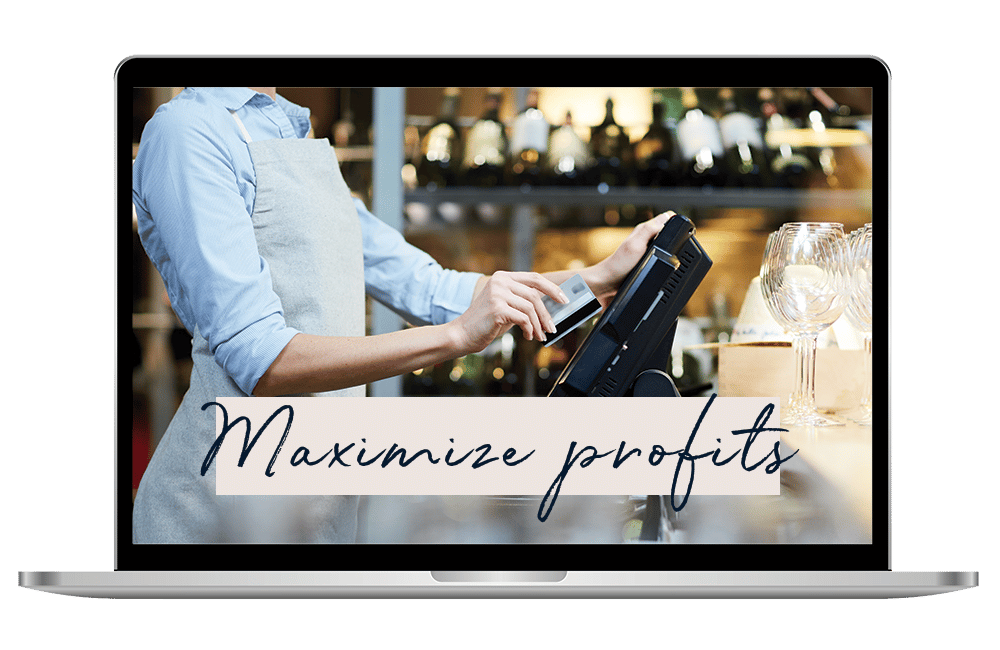
The three costly mistakes you could unknowingly be making?
Find out in this FREE guide and restaurant assessment specifically designed to reveal the unexpected hurdles standing between you and exponential business growth.
Thank You To Our Sponsors

The Employee Retention Tax Credit We will help you determine your eligibility for 2020 & 2021 - Get Started
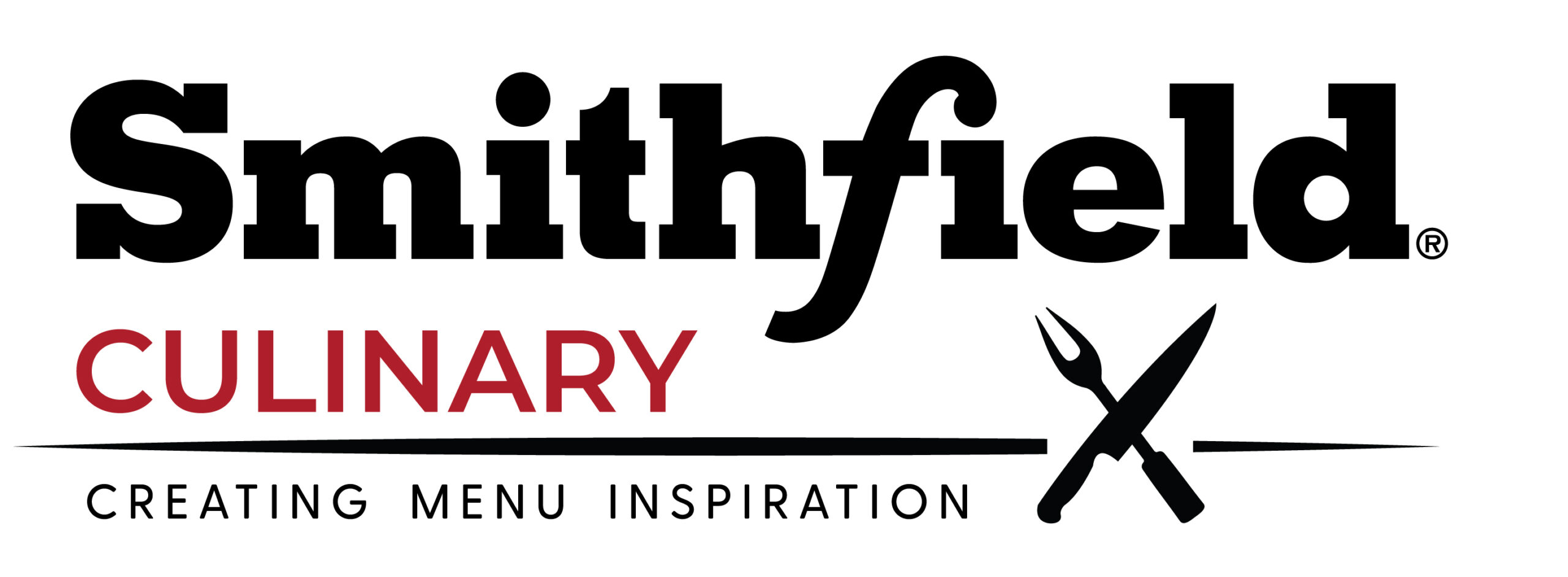
Inspiring Head-Turning Menu Creativity
Culinary Trends & Chef Inspired Recipes - Learn More
Want to become a podcast sponsor?
Please get in touch with Roger at roger@restaurantrockstars.com
